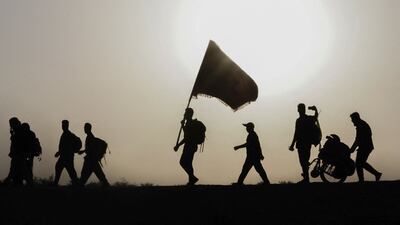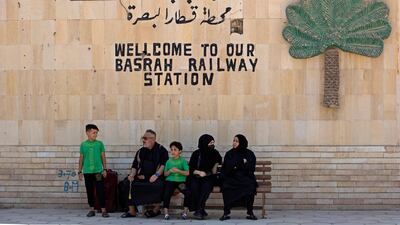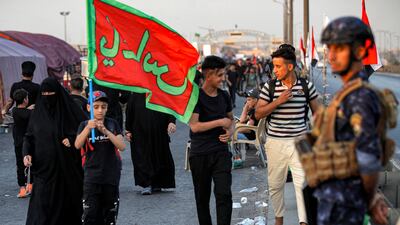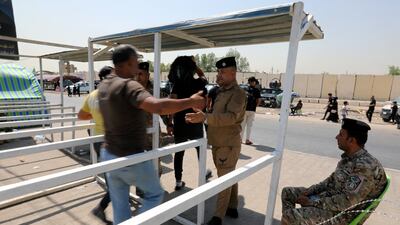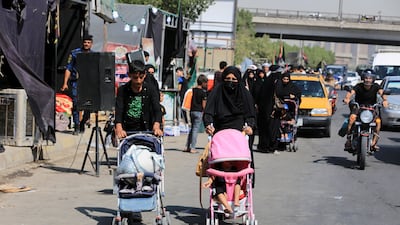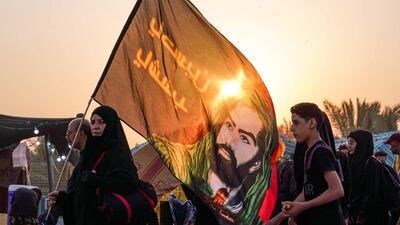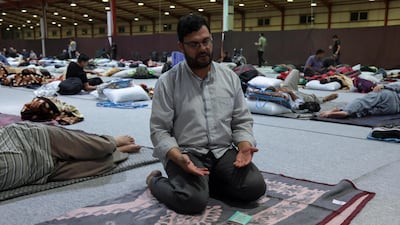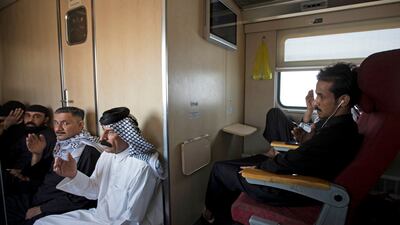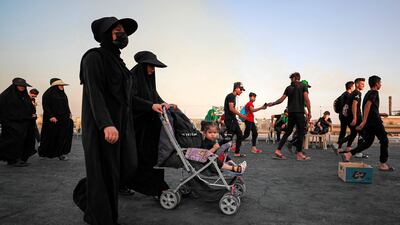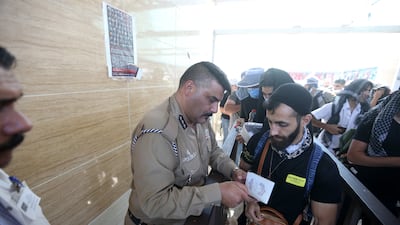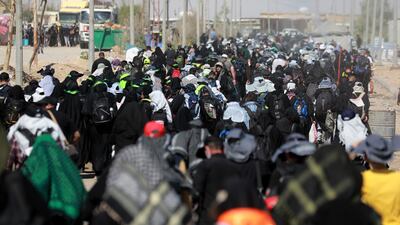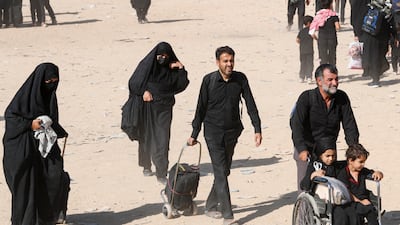The influx of Shiite pilgrims in the Iraqi city of Karbala, many from outside the country, has helped businesses to recover after a three-year slump caused by social unrest and the Covid-19 pandemic.
The pilgrimage, known as Arbaeen, marks the end of a 40-day mourning period for the Prophet Mohammed's grandson Imam Hussein, who was killed in battle at Karbala in the seventh century.
Millions of pilgrims walk from Shiite-dominated areas in the central and southern parts of Iraq as they head to Karbala to visit the gold-domed shrines of Imam Hussein and his brother Imam Abbas.
Foreign pilgrims, mainly Iranians, join them on that journey.
“The numbers this year are bigger than what we expected,” Azhar Al Kalash, owner of two hotels in Karbala, told The National. “Pilgrims are streaming in big numbers.”
The pandemic and violence linked to the 2019 pro-reform protests, which began in major cities in central and southern Iraq, kept foreign pilgrims away from Karbala.
Last year, Iraq eased travel restrictions and allowed 80,000 foreign pilgrims to enter the country, the majority of them Iranian. There are no limits this year.
Mr Al Kalash’s two hotels felt the pinch as occupancy rates dropped sharply before recovering last year to reach about 50 per cent of the levels before the pandemic.
“This year, the occupancy rate jumped to 100 per cent in the two hotels and we even offered more beds above the 380-bed capacity,” he said.
“The pilgrims thirst for this pilgrimage after all these years. A big religious festival is taking place now in Karbala. This is the first time to see such turnout.”
About 2.8 million foreign pilgrims entered Iraq between July 31 and September 12, the Commission of Border Crossing Points said on Wednesday.
The number of Iranian pilgrims is expected to reach five million, with Karbala set for a record turnout of more than 20 million this year. The pilgrimage comes to an end on Saturday.
Unlike in previous years, pilgrims began to enter the city at the end of August, Mohammed Al Hir, the head of the hotels' association in Karbala, told The National.
All 1,200 hotels and licensed residences in the city are fully booked, he said.
“This year, we are seeing an exceptional increase in the number of pilgrims due to their longing for being in Karbala again,” he said.
The high number of Iranian pilgrims has prompted Tehran to shut the country's border crossings from time to time to control the flow. Iran has also advised its citizens not to stay for long in Iraq as it seeks to ease pressure at border posts.
To cope with the rising numbers, provincial authorities in Karbala have opened schools, mosques and unfinished buildings to accommodate pilgrims, while some families have offered to host them in their own homes.
That influx has put more pressure on the dilapidated infrastructure and public services, which have been affected by decades of conflict, neglect and endemic corruption.
The city is struggling with a severe water and electricity crisis, with disruptions lasting up to 24 hours, Mr Al Kalash said.
More than a dozen Iranian pilgrims have lost their lives in car accidents on roads full of potholes, with the lack of power exacerbating the situation as motorways are plunged into darkness at night.
Along all the roads leading to Karbala, volunteers are offering pilgrims free food and drinks, as well as massages for those in pain. Others spray water on pilgrims to help them cool down under the scorching sun.
Thousands of pilgrims are sleeping on the streets, near the ornately decorated shrines.
Ameer Bashir, who owns a tiny souvenir shop opposite the shrines, said he was happy to see foreign pilgrims return to his home town.
The government's decision to remove limits on pilgrim numbers encouraged Mr Bashir to buy more stock for this year.
Before the start of the pilgrimage, he ordered silver jewellery, prayer beads, rugs, shrouds, watches and mobile phone accessories worth $14,000. He spent $4,000 last year.
The shop is open 24 hours a day and Mr Bashir and his brother have hired two workers. Sales are up by as much as 70 per cent, compared with last year.
“The atmosphere is amazing and business is doing well, like in the old days,” he said.
Sheikh Zayed's poem
When it is unveiled at Abu Dhabi Art, the Standing Tall exhibition will appear as an interplay of poetry and art. The 100 scarves are 100 fragments surrounding five, figurative, female sculptures, and both sculptures and scarves are hand-embroidered by a group of refugee women artisans, who used the Palestinian cross-stitch embroidery art of tatreez. Fragments of Sheikh Zayed’s poem Your Love is Ruling My Heart, written in Arabic as a love poem to his nation, are embroidered onto both the sculptures and the scarves. Here is the English translation.
Your love is ruling over my heart
Your love is ruling over my heart, even a mountain can’t bear all of it
Woe for my heart of such a love, if it befell it and made it its home
You came on me like a gleaming sun, you are the cure for my soul of its sickness
Be lenient on me, oh tender one, and have mercy on who because of you is in ruins
You are like the Ajeed Al-reem [leader of the gazelle herd] for my country, the source of all of its knowledge
You waddle even when you stand still, with feet white like the blooming of the dates of the palm
Oh, who wishes to deprive me of sleep, the night has ended and I still have not seen you
You are the cure for my sickness and my support, you dried my throat up let me go and damp it
Help me, oh children of mine, for in his love my life will pass me by.
Innotech Profile
Date started: 2013
Founder/CEO: Othman Al Mandhari
Based: Muscat, Oman
Sector: Additive manufacturing, 3D printing technologies
Size: 15 full-time employees
Stage: Seed stage and seeking Series A round of financing
Investors: Oman Technology Fund from 2017 to 2019, exited through an agreement with a new investor to secure new funding that it under negotiation right now.
Developer: Ubisoft Montreal / Ubisoft Toronto
Publisher: Ubisoft
Platforms: Playstation 4, Xbox One, Windows
Release Date: April 10
500 People from Gaza enter France
115 Special programme for artists
25 Evacuation of injured and sick
MATCH SCHEDULE
Uefa Champions League semi-final, first leg
Tuesday, April 24 (10.45pm)
Liverpool v Roma
Wednesday, April 25
Bayern Munich v Real Madrid (10.45pm)
Europa League semi-final, first leg
Thursday, April 26
Arsenal v Atletico Madrid (11.05pm)
Marseille v Salzburg (11.05pm)
How to help
Call the hotline on 0502955999 or send "thenational" to the following numbers:
2289 - Dh10
2252 - Dh50
6025 - Dh20
6027 - Dh100
6026 - Dh200
UAE currency: the story behind the money in your pockets
3%20Body%20Problem
%3Cp%3E%3Cstrong%3ECreators%3A%3C%2Fstrong%3E%20David%20Benioff%2C%20D%20B%20Weiss%2C%20Alexander%20Woo%3C%2Fp%3E%0A%3Cp%3E%3Cstrong%3EStarring%3A%20%3C%2Fstrong%3EBenedict%20Wong%2C%20Jess%20Hong%2C%20Jovan%20Adepo%2C%20Eiza%20Gonzalez%2C%20John%20Bradley%2C%20Alex%20Sharp%3C%2Fp%3E%0A%3Cp%3E%3Cstrong%3ERating%3A%3C%2Fstrong%3E%203%2F5%3C%2Fp%3E%0A
Paltan
Producer: JP Films, Zee Studios
Director: JP Dutta
Cast: Jackie Shroff, Sonu Sood, Arjun Rampal, Siddhanth Kapoor, Luv Sinha and Harshvardhan Rane
Rating: 2/5
COMPANY PROFILE
Name: Kumulus Water
Started: 2021
Founders: Iheb Triki and Mohamed Ali Abid
Based: Tunisia
Sector: Water technology
Number of staff: 22
Investment raised: $4 million
The specs
Engine: 4.0-litre V8 twin-turbocharged and three electric motors
Power: Combined output 920hp
Torque: 730Nm at 4,000-7,000rpm
Transmission: 8-speed dual-clutch automatic
Fuel consumption: 11.2L/100km
On sale: Now, deliveries expected later in 2025
Price: expected to start at Dh1,432,000
Banned items
Dubai Police has also issued a list of banned items at the ground on Sunday. These include:
-
-
-
-
-
-
-
-
-
Political flags or banners
-
Bikes, skateboards or scooters
The%20specs
%3Cp%3E%0D%3Cstrong%3EEngine%3A%20%3C%2Fstrong%3E4.0-litre%20twin-turbo%20V8%0D%3Cbr%3E%3Cstrong%3EPower%3A%20%3C%2Fstrong%3E666hp%20at%206%2C000rpm%0D%3Cbr%3E%3Cstrong%3ETorque%3A%20%3C%2Fstrong%3E850Nm%20at%202%2C300-4%2C500rpm%0D%3Cbr%3E%3Cstrong%3ETransmission%3A%20%3C%2Fstrong%3E8-speed%20auto%0D%3Cbr%3E%3Cstrong%3EOn%20sale%3A%20%3C%2Fstrong%3EQ1%202023%0D%3Cbr%3E%3Cstrong%3EPrice%3A%20%3C%2Fstrong%3Efrom%20Dh1.15%20million%20(estimate)%3C%2Fp%3E%0A
if you go
The flights
Emirates have direct flights from Dubai to Glasgow from Dh3,115. Alternatively, if you want to see a bit of Edinburgh first, then you can fly there direct with Etihad from Abu Dhabi.
The hotel
|
Located in the heart of Mackintosh's Glasgow, the Dakota Deluxe is perhaps the most refined hotel anywhere in the city. Doubles from Dh850
|
Events and tours
There are various Mackintosh specific events throughout 2018 – for more details and to see a map of his surviving designs see glasgowmackintosh.com
For walking tours focussing on the Glasgow Style, see the website of the Glasgow School of Art.
More information
For ideas on planning a trip to Scotland, visit www.visitscotland.com
UAE v Gibraltar
What: International friendly
When: 7pm kick off
Where: Rugby Park, Dubai Sports City
Admission: Free
Online: The match will be broadcast live on Dubai Exiles’ Facebook page
UAE squad: Lucas Waddington (Dubai Exiles), Gio Fourie (Exiles), Craig Nutt (Abu Dhabi Harlequins), Phil Brady (Harlequins), Daniel Perry (Dubai Hurricanes), Esekaia Dranibota (Harlequins), Matt Mills (Exiles), Jaen Botes (Exiles), Kristian Stinson (Exiles), Murray Reason (Abu Dhabi Saracens), Dave Knight (Hurricanes), Ross Samson (Jebel Ali Dragons), DuRandt Gerber (Exiles), Saki Naisau (Dragons), Andrew Powell (Hurricanes), Emosi Vacanau (Harlequins), Niko Volavola (Dragons), Matt Richards (Dragons), Luke Stevenson (Harlequins), Josh Ives (Dubai Sports City Eagles), Sean Stevens (Saracens), Thinus Steyn (Exiles)
Army of the Dead
Director: Zack Snyder
Stars: Dave Bautista, Ella Purnell, Omari Hardwick, Ana de la Reguera
Three stars
Defence review at a glance
• Increase defence spending to 2.5% of GDP by 2027 but given “turbulent times it may be necessary to go faster”
• Prioritise a shift towards working with AI and autonomous systems
• Invest in the resilience of military space systems.
• Number of active reserves should be increased by 20%
• More F-35 fighter jets required in the next decade
• New “hybrid Navy” with AUKUS submarines and autonomous vessels
What the law says
Micro-retirement is not a recognised concept or employment status under Federal Decree Law No. 33 of 2021 on the Regulation of Labour Relations (as amended) (UAE Labour Law). As such, it reflects a voluntary work-life balance practice, rather than a recognised legal employment category, according to Dilini Loku, senior associate for law firm Gateley Middle East.
“Some companies may offer formal sabbatical policies or career break programmes; however, beyond such arrangements, there is no automatic right or statutory entitlement to extended breaks,” she explains.
“Any leave taken beyond statutory entitlements, such as annual leave, is typically regarded as unpaid leave in accordance with Article 33 of the UAE Labour Law. While employees may legally take unpaid leave, such requests are subject to the employer’s discretion and require approval.”
If an employee resigns to pursue micro-retirement, the employment contract is terminated, and the employer is under no legal obligation to rehire the employee in the future unless specific contractual agreements are in place (such as return-to-work arrangements), which are generally uncommon, Ms Loku adds.
11 cabbie-recommended restaurants and dishes to try in Abu Dhabi
Iqbal Restaurant behind Wendy’s on Hamdan Street for the chicken karahi (Dh14)
Pathemari in Navy Gate for prawn biryani (from Dh12 to Dh35)
Abu Al Nasar near Abu Dhabi Mall, for biryani (from Dh12 to Dh20)
Bonna Annee at Navy Gate for Ethiopian food (the Bonna Annee special costs Dh42 and comes with a mix of six house stews – key wet, minchet abesh, kekel, meser be sega, tibs fir fir and shiro).
Al Habasha in Tanker Mai for Ethiopian food (tibs, a hearty stew with meat, is a popular dish; here it costs Dh36.75 for lamb and beef versions)
Himalayan Restaurant in Mussaffa for Nepalese (the momos and chowmein noodles are best-selling items, and go for between Dh14 and Dh20)
Makalu in Mussaffa for Nepalese (get the chicken curry or chicken fry for Dh11)
Al Shaheen Cafeteria near Guardian Towers for a quick morning bite, especially the egg sandwich in paratha (Dh3.50)
Pinky Food Restaurant in Tanker Mai for tilapia
Tasty Zone for Nepalese-style noodles (Dh15)
Ibrahimi for Pakistani food (a quarter chicken tikka with roti costs Dh16)
The biog
Favourite book: Homegoing by Yaa Gyasi
Favourite holiday destination: Spain
Favourite film: Bohemian Rhapsody
Favourite place to visit in the UAE: The beach or Satwa
Children: Stepdaughter Tyler 27, daughter Quito 22 and son Dali 19
Meydan racecard:
6.30pm: Al Maktoum Challenge Round 2 (PA) Group 1 | US$75,000 (Dirt) | 2,200 metres
7.05pm: UAE 1000 Guineas (TB) Listed | $250,000 (D) | 1,600m
7.40pm: Meydan Classic Trial (TB) Conditions | $100,000 (Turf) | 1,400m
8.15pm: Al Shindagha Sprint (TB) Group 3 | $200,000 (D) | 1,200m
8.50pm: Handicap (TB) | $175,000 (D) | 1,600m
9.25pm: Handicap (TB) | $175,000 (T) | 2,000m
10pm: Handicap (TB) | $135,000 (T) | 1,600m
Tree of Hell
Starring: Raed Zeno, Hadi Awada, Dr Mohammad Abdalla
Director: Raed Zeno
Rating: 4/5
Get Out
Director: Jordan Peele
Stars: Daniel Kaluuya, Allison Williams, Catherine Keener, Bradley Whitford
Four stars
More from Neighbourhood Watch:
WOMAN AND CHILD
Director: Saeed Roustaee
Starring: Parinaz Izadyar, Payman Maadi
Rating: 4/5
Rajasthan Royals 153-5 (17.5 ov)
Delhi Daredevils 60-4 (6 ov)
Rajasthan won by 10 runs (D/L method)
Results
4pm: Al Bastakiya Listed US$300,000 (Dirt) 1,900m; Winner: Emblem Storm, Oisin Murphy (jockey), Satish Seemar (trainer).
4.35pm: Mahab Al Shimaal Group 3 $350,000 (D) 1,200m; Winner: Wafy, Tadhg O’Shea, Satish Seemar.
5.10pm: Nad Al Sheba Turf Group 3 $350,000 (Turf) 1,200m; Winner: Wildman Jack, Fernando Jara, Doug O’Neill.
5.45pm: Burj Nahaar Group 3 $350,000 (D) 1,600m; Winner: Salute The Soldier, Adrie de Vries, Fawzi Nass.
6.20pm: Jebel Hatta Group 1 $400,000 (T) 1,800m; Winner: Barney Roy, William Buick, Charlie Appleby.
6.55pm: Al Maktoum Challenge Round-3 Group 1 $600,000 (D) 2,000m; Winner: Matterhorn, Mickael Barzalona, Salem bin Ghadayer.
7.30pm: Dubai City Of Gold Group 2 $350,000 (T) 2,410m; Winner: Loxley, Mickael Barzalona, Charlie Appleby.
Our House, Louise Candlish,
Simon & Schuster
COMPANY%20PROFILE
%3Cp%3E%3Cstrong%3EName%3A%3C%2Fstrong%3E%20Floward%0D%3Cbr%3E%3Cstrong%3EBased%3A%20%3C%2Fstrong%3ERiyadh%2C%20Saudi%20Arabia%0D%3Cbr%3E%3Cstrong%3EFounders%3A%20%3C%2Fstrong%3EAbdulaziz%20Al%20Loughani%20and%20Mohamed%20Al%20Arifi%0D%3Cbr%3E%3Cstrong%3ESector%3A%20%3C%2Fstrong%3EE-commerce%0D%3Cbr%3E%3Cstrong%3ETotal%20funding%3A%20%3C%2Fstrong%3EAbout%20%24200%20million%0D%3Cbr%3E%3Cstrong%3EInvestors%3A%20%3C%2Fstrong%3EAljazira%20Capital%2C%20Rainwater%20Partners%2C%20STV%20and%20Impact46%0D%3Cbr%3E%3Cstrong%3ENumber%20of%20employees%3A%20%3C%2Fstrong%3E1%2C200%3C%2Fp%3E%0A
Titanium Escrow profile
Started: December 2016
Founder: Ibrahim Kamalmaz
Based: UAE
Sector: Finance / legal
Size: 3 employees, pre-revenue
Stage: Early stage
Investors: Founder's friends and Family
The National's picks
4.35pm: Tilal Al Khalediah
5.10pm: Continous
5.45pm: Raging Torrent
6.20pm: West Acre
7pm: Flood Zone
7.40pm: Straight No Chaser
8.15pm: Romantic Warrior
8.50pm: Calandogan
9.30pm: Forever Young
UAE currency: the story behind the money in your pockets




